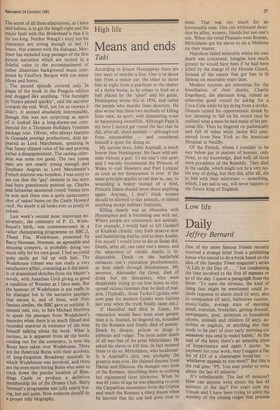High life
Means and ends
Taki
According to Ernest Hemingway there are two ways to murder a lion. One is to shoot him from a motor car, the other to shoot him at night from a platform or the shelter of a thorn boma, as he comes to feed on a bait placed by the 'sport' and his guide. Hemingway wrote this in 1934, and called the people who murder lions shootists. He also wrote that these two methods of killing lions rank, as sport, with dynamiting trout or harpooning swordfish. Although Papa is my hero I cannot get round the fact that he did, after all, shoot animals — although not from automobiles — and considered himself a sport for doing so.
My current hero, John Aspinall, is much braver than Hemingway. He faces wild animals without a gun. To me that's real sport and I warmly recommend the Princess of Wales to visit Howletts and Port Lympne as soon as her honeymoon is over. If the same principle applies to red deer as, say, to wounding a beater instead of a bird, Princess Diana should never shoot anything again. Anyway, I don't think women should be allowed to slay animals, or indeed anything except militant feminists.
Killing cleanly was an obsession with Hemingway and is becoming one with me. Where people are concerned, not animals. For example, I would hate to kill Gaddafi or Khalkali cleanly; they both deserve slow and humiliating deaths; and so does Arafat. For myself I would love to die as Sadat did. Death, after all, can raise one's status, and the smartness of certain deaths is indisputable. Death on the battlefield enhances one's reputation posthumously, as does death through drunkenness. My ancestor, Alexander the Great, died of drink but his detractors, who were desperately trying to cut him down to size, spread vicious rumours that he died of malaria. (Typically, those Turko-Cypriots who now pass for modern Greeks were furious last year when the truth finally came out.) If Hannibal had died in Zama, his reputation would have been even greater than it is. Instead, he lingered on, hounded by the Romans and finally died of poison. Death by disease, poison or drugs is plebeian and vulgar. The most noble death of all was that of the great Mithridates. He asked his slaves to kill him, in fact ordered them to do so. Mithridates, who incidentally is Aspinall's idol, was probably the greatest man ever. He claimed descent from Darius and Sileucus. He thought very little of the Romans, describing them as nothing but regimented farm labourers. When he was 65 years of age he was planning to cross the Carpathian mountains from the Crimea and teach the Romans a sharp lesson when he learned that his son had gone over to them. That was too much for an honourable man. One can withstand desertion by allies, women, friends but not one's son. When the venal Phanasis went Roman, Mithridates got his slaves to do a Mishima on their master.
Napoleon failed miserably where his own death was concerned. Imagine how much greater he would have been if he had been killed by the charge of the Hessian Guard, instead of the cancer that got him in St Helena six miserable years later.
Modern tycoons are notorious for the humiliation of their deaths. Charlie Engelhard, the platinum king, ruined an otherwise good record by asking for a Coca-Cola while he lay dying from a stroke. Onassis ruined his opportunistic streak by not choosing to fall on his sword once he realised what a mess he had made of his personal life. Thus he lingered on pathetically and full of tubes while Jackie KO commuted from New York to the American Hospital in Neuilly.
Of the French, whom I consider to be way below par in matters of honour, only three, to my knowledge, died well; all three were presidents of the Republic. They died in the saddle, which might not be a very noble way of dying, but they did, after all, die in bed with their mistresses — something, which, I am sad to say, will never happen to the future king of England.


































 Previous page
Previous page